Resume
Hospice Nurse Cover Letter Examples

May 29, 2025
|
12 min read
Crafting a hospice nurse cover letter: Stand out by showcasing your compassionate nature and strong nursing skills. Dive into tips and examples that help you make an impact—because sometimes, this is the "write" care your career needs.
4.70 Average rating
Rated by 348 people
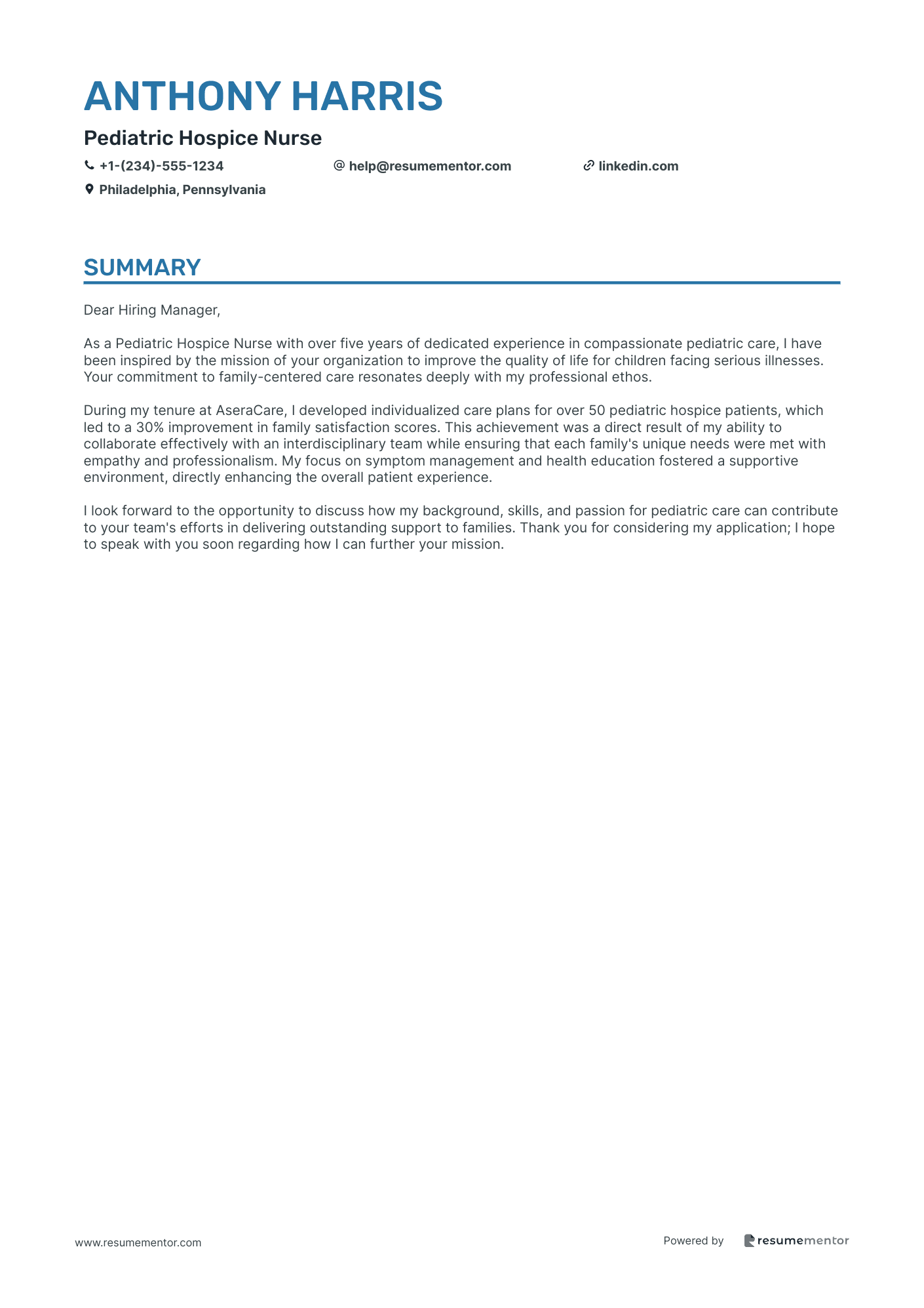
Pediatric Hospice Nurse
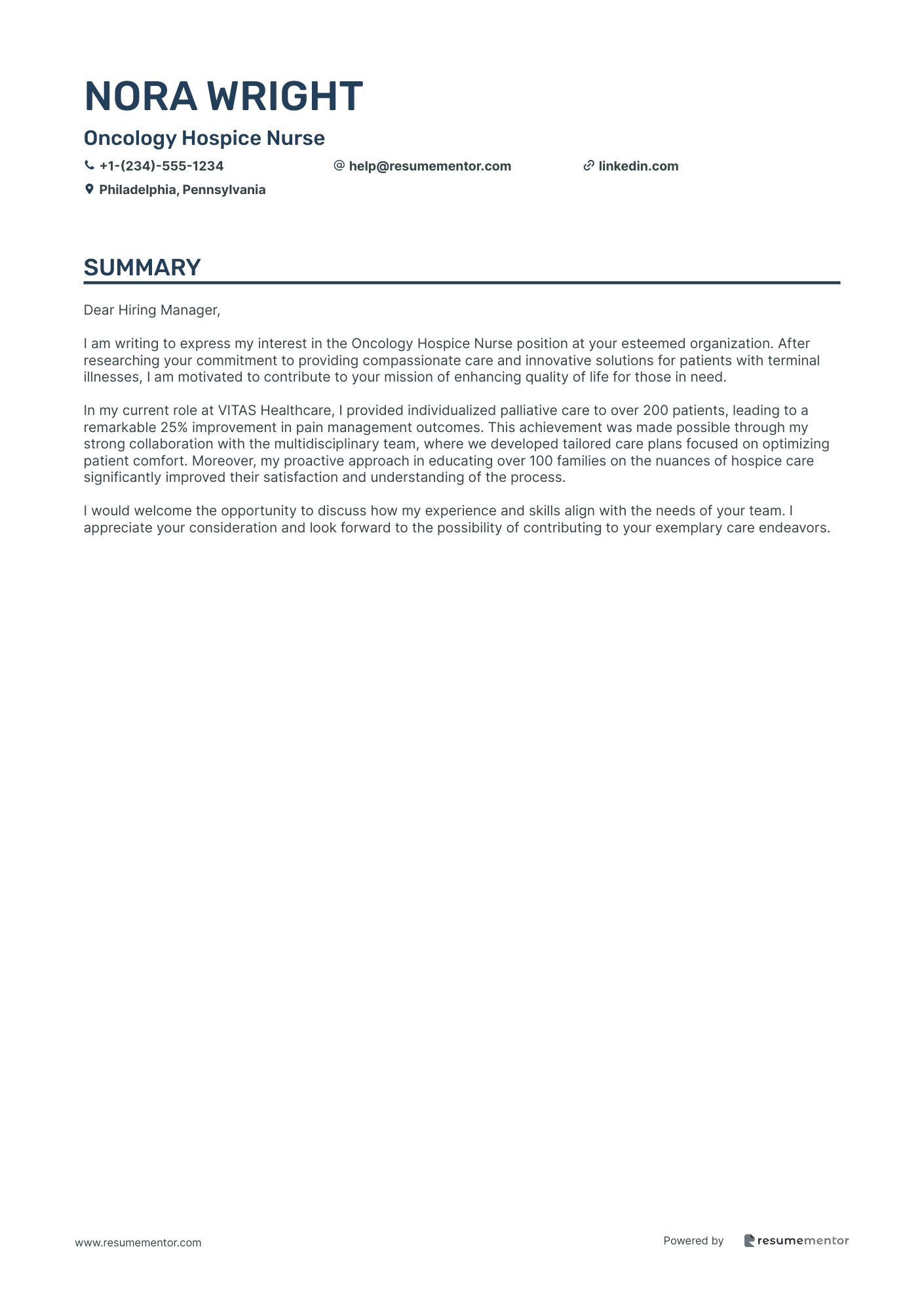
Oncology Hospice Nurse
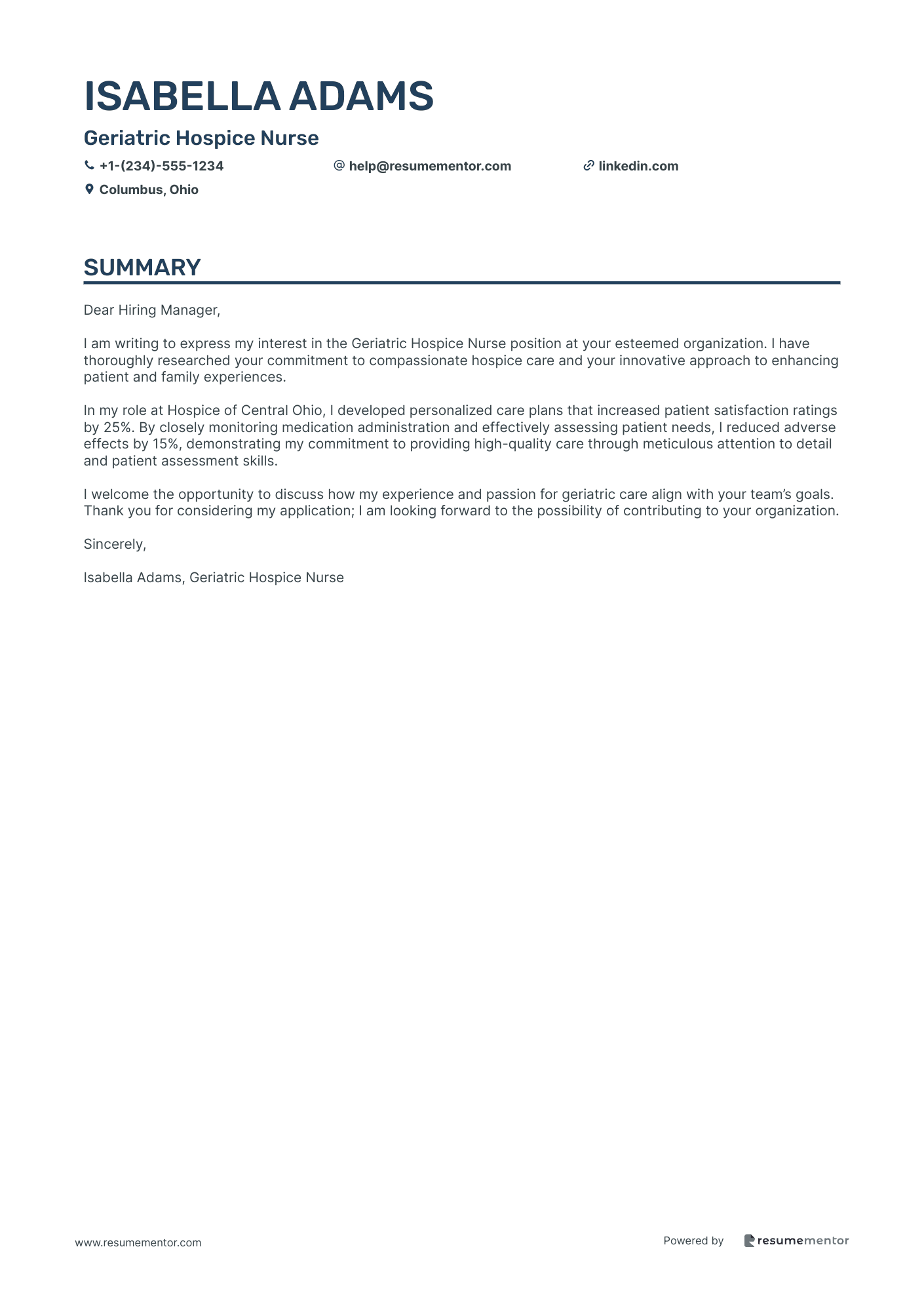
Geriatric Hospice Nurse
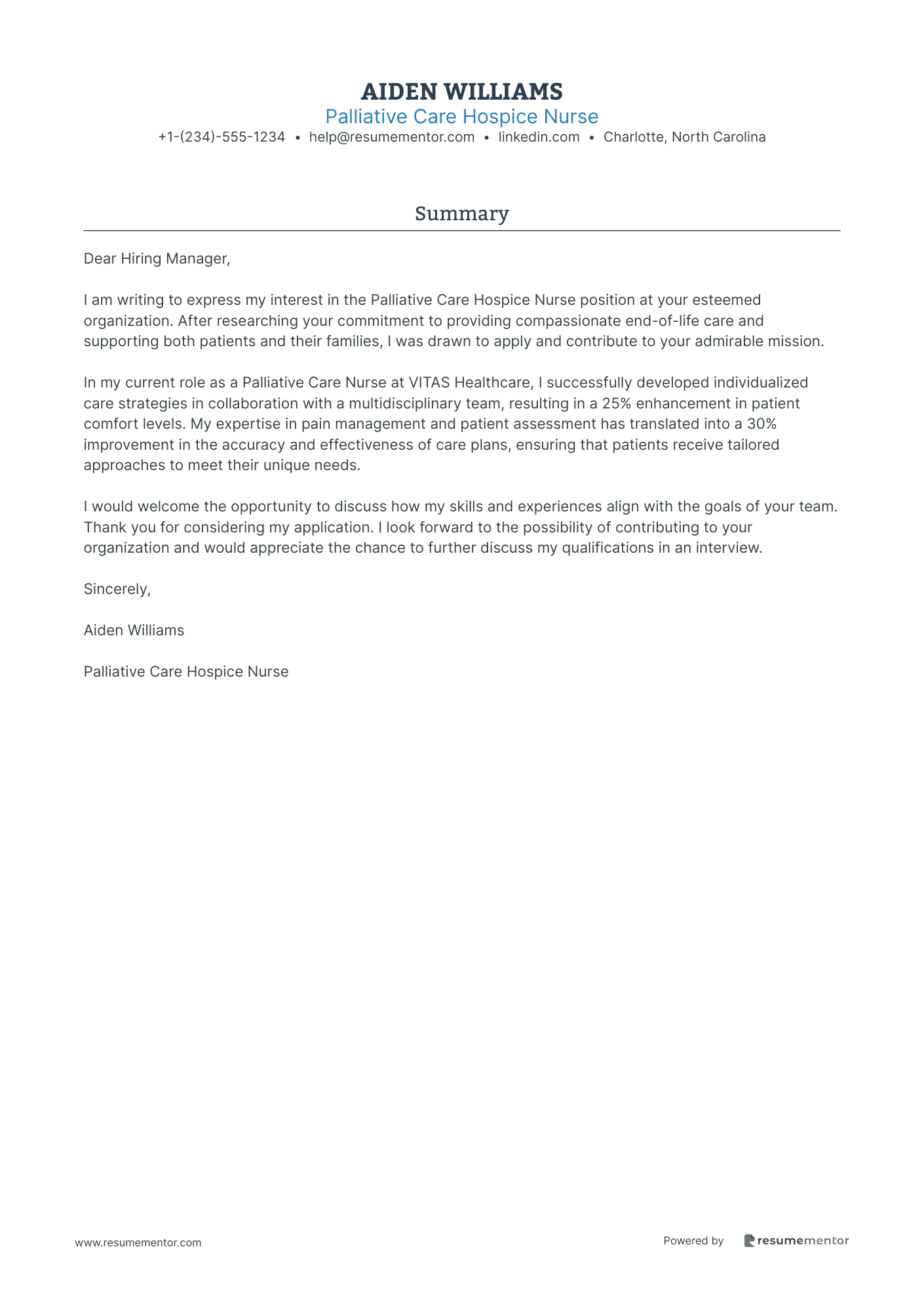
Palliative Care Hospice Nurse
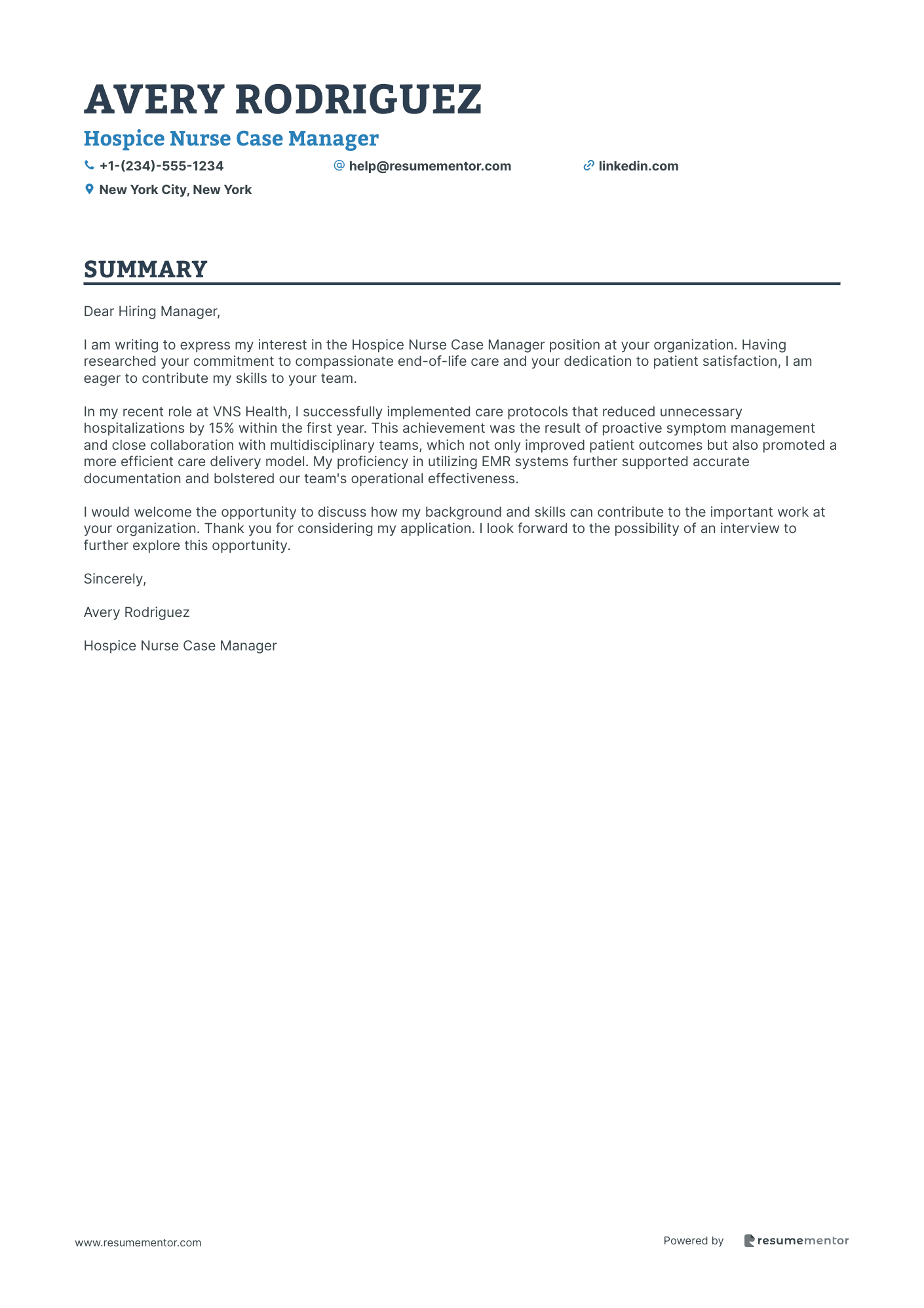
Hospice Nurse Case Manager
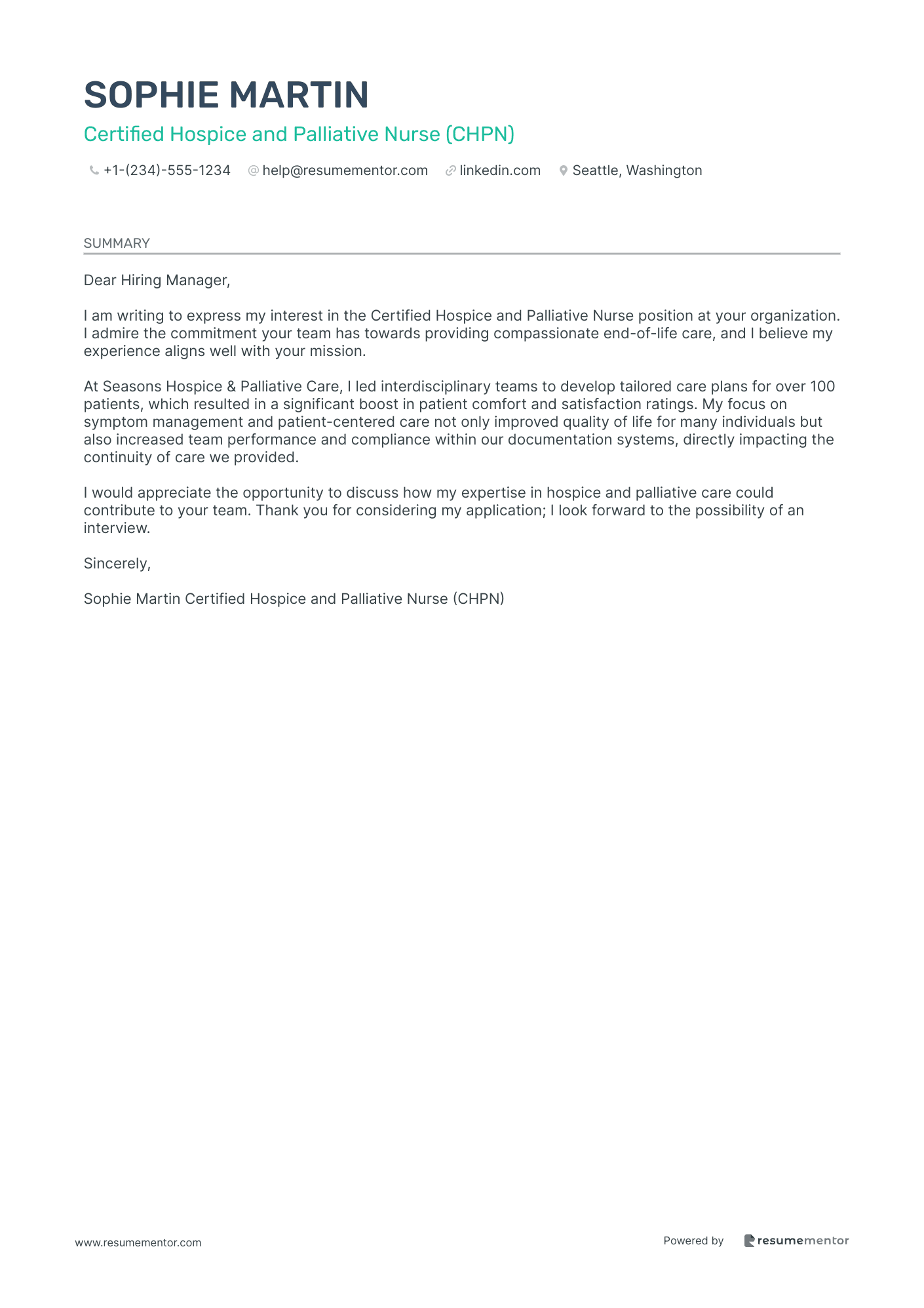
Certified Hospice and Palliative Nurse (CHPN)
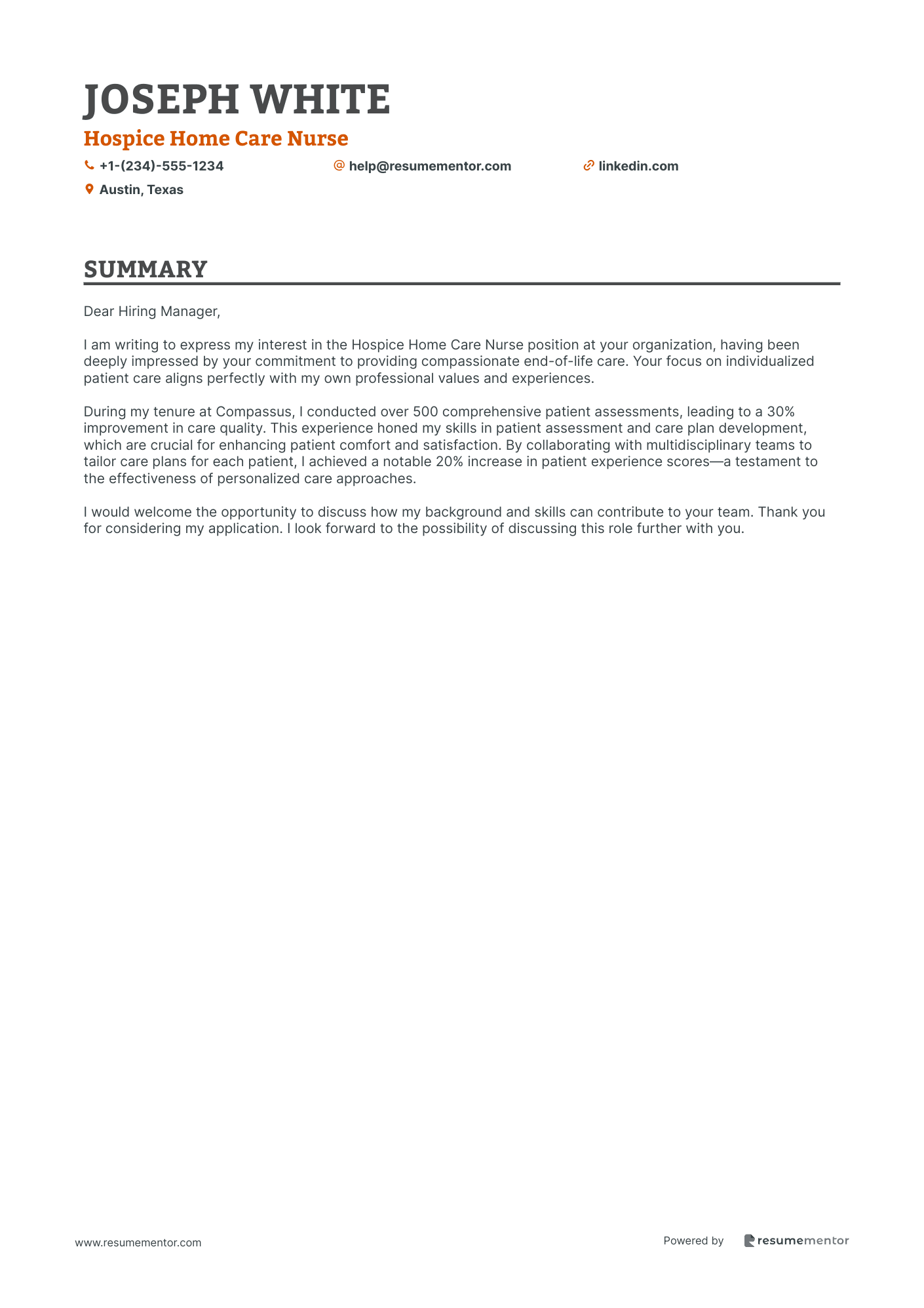
Hospice Home Care Nurse
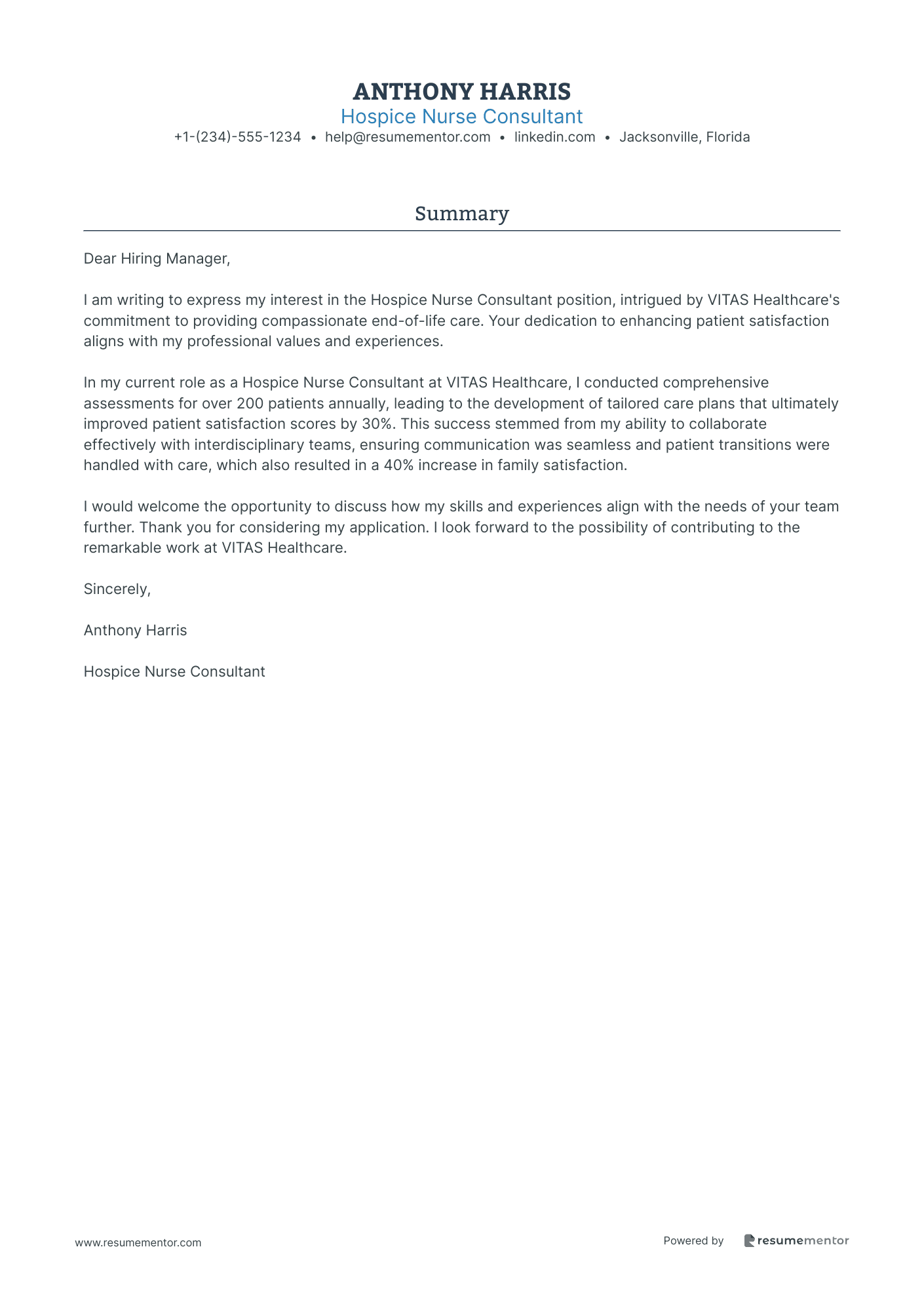
Hospice Nurse Consultant
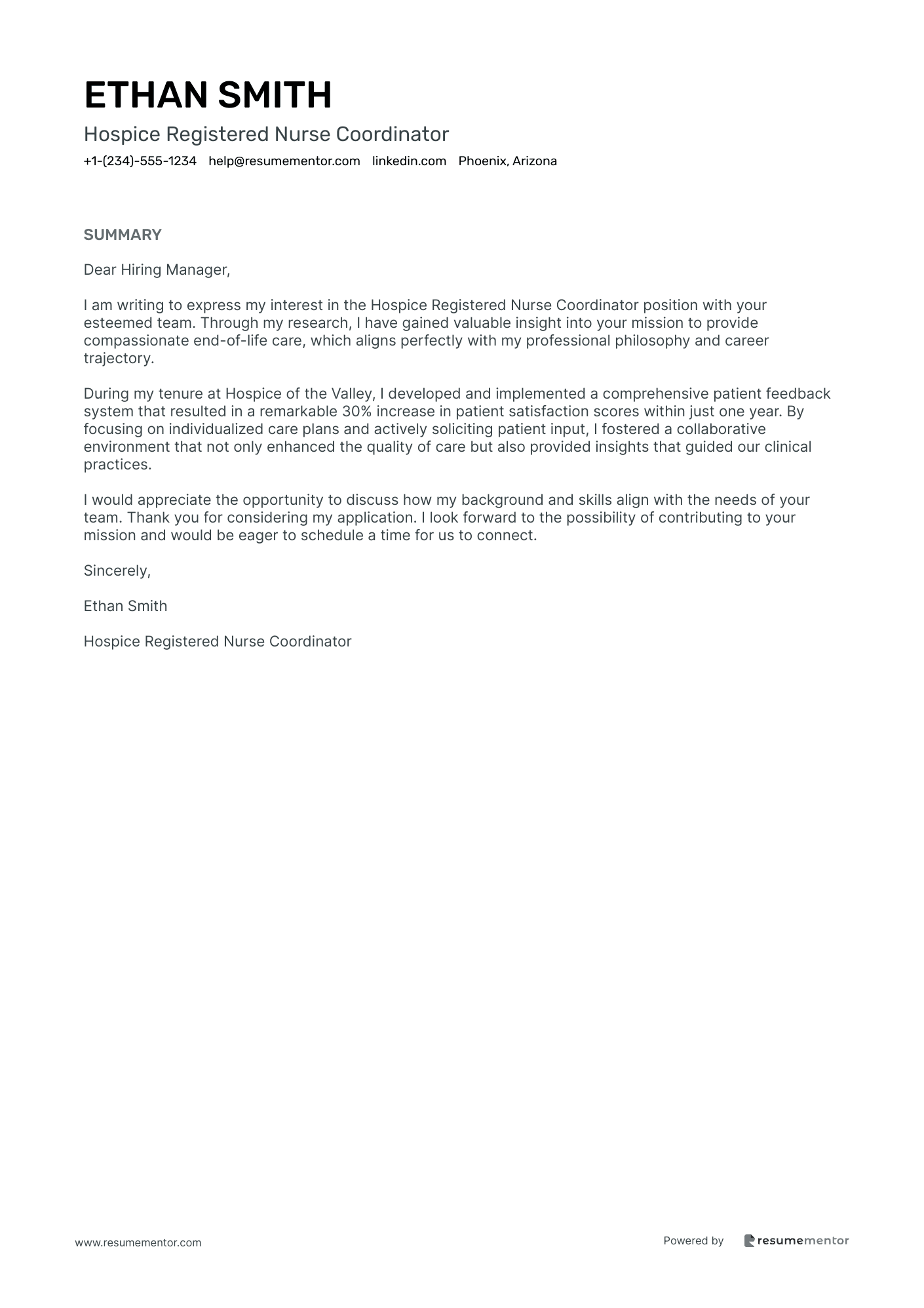
Hospice Registered Nurse Coordinator
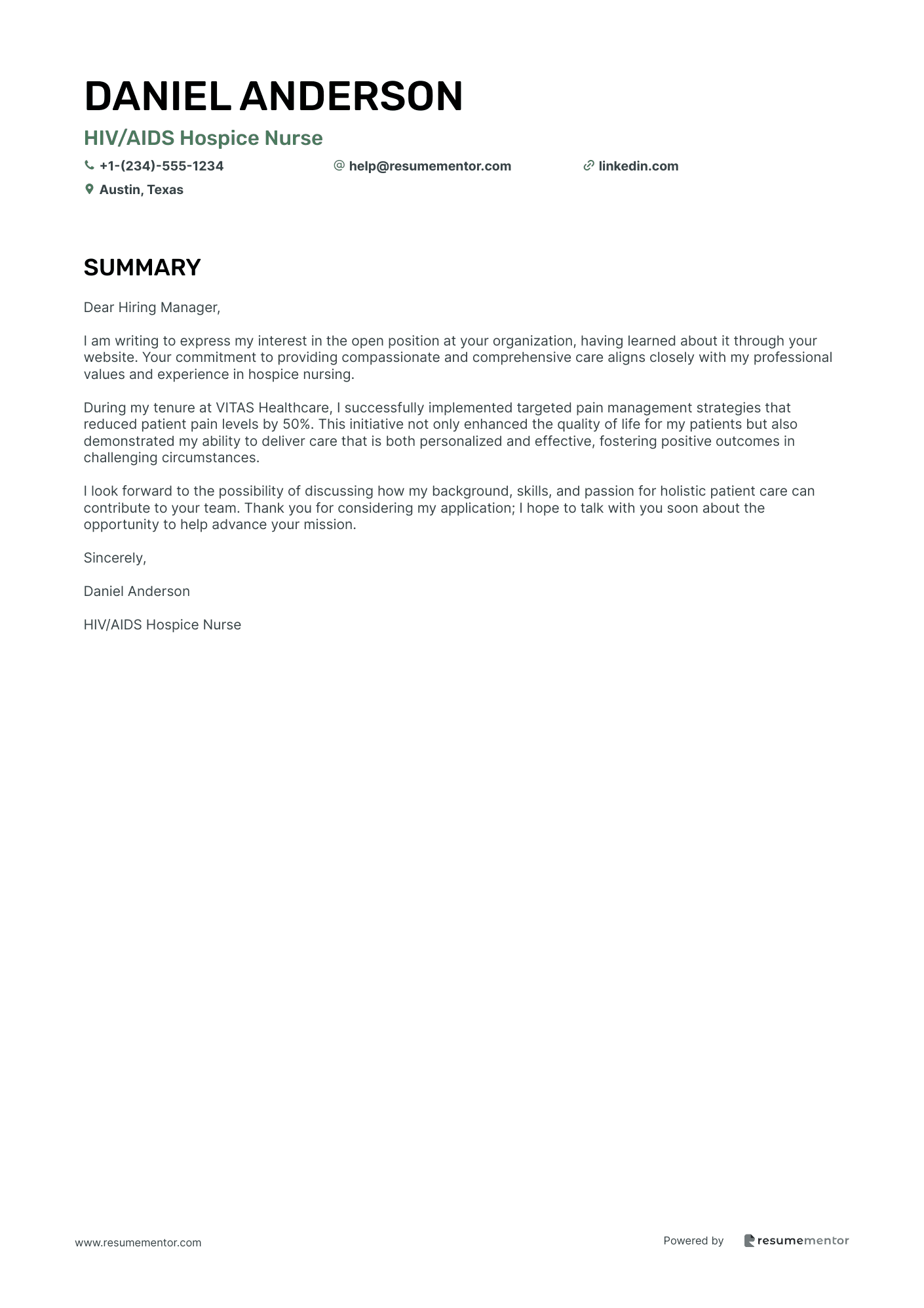
HIV/AIDS Hospice Nurse

Pediatric Hospice Nurse cover letter sample
When preparing your cover letter, emphasize any prior experience in pediatric care or end-of-life support. Highlight your proficiency in pain management and comfort care techniques. Showcase strong communication skills, particularly in interacting with families during difficult times. Mention any relevant training or certifications, such as pediatric advanced life support. Provide specific examples of how your compassion and support have positively influenced both patients and families. Use a 'skill-action-result' framework to demonstrate how your interventions improved patient comfort and family trust.
Anthony Harris
Pediatric Hospice Nurse
Summary
Dear Hiring Manager,
As a Pediatric Hospice Nurse with over five years of dedicated experience in compassionate pediatric care, I have been inspired by the mission of your organization to improve the quality of life for children facing serious illnesses. Your commitment to family-centered care resonates deeply with my professional ethos.
During my tenure at AseraCare, I developed individualized care plans for over 50 pediatric hospice patients, which led to a 30% improvement in family satisfaction scores. This achievement was a direct result of my ability to collaborate effectively with an interdisciplinary team while ensuring that each family's unique needs were met with empathy and professionalism. My focus on symptom management and health education fostered a supportive environment, directly enhancing the overall patient experience.
I look forward to the opportunity to discuss how my background, skills, and passion for pediatric care can contribute to your team's efforts in delivering outstanding support to families. Thank you for considering my application; I hope to speak with you soon regarding how I can further your mission.
Oncology Hospice Nurse cover letter sample
When applying for this position, it's essential to highlight any nursing experience, particularly in oncology or palliative care. Emphasize your strong patient assessment skills and the ability to manage complex symptoms. If you have completed relevant training, such as pain management or end-of-life care workshops, mention these qualifications. Additionally, provide examples of how you've supported families during difficult times, illustrating the impact of your compassionate care. Adopting a 'skill-action-result' structure can effectively demonstrate your contributions to patient comfort and overall care quality.
Nora Wright
Oncology Hospice Nurse
Summary
Dear Hiring Manager,
I am writing to express my interest in the Oncology Hospice Nurse position at your esteemed organization. After researching your commitment to providing compassionate care and innovative solutions for patients with terminal illnesses, I am motivated to contribute to your mission of enhancing quality of life for those in need.
In my current role at VITAS Healthcare, I provided individualized palliative care to over 200 patients, leading to a remarkable 25% improvement in pain management outcomes. This achievement was made possible through my strong collaboration with the multidisciplinary team, where we developed tailored care plans focused on optimizing patient comfort. Moreover, my proactive approach in educating over 100 families on the nuances of hospice care significantly improved their satisfaction and understanding of the process.
I would welcome the opportunity to discuss how my experience and skills align with the needs of your team. I appreciate your consideration and look forward to the possibility of contributing to your exemplary care endeavors.
Geriatric Hospice Nurse cover letter sample
When applying for this role, it’s essential to emphasize your clinical experience in palliative care and gerontology. Highlight your ability to manage pain and symptoms and your proficiency in working with multidisciplinary teams. Mention any specialized training, such as certifications in palliative care or hospice services. Use specific examples of how your compassion and communication skills have positively impacted patient comfort and family satisfaction. Incorporate the 'skill-action-result' approach to demonstrate your capacity for effective decision-making and advocacy for patient needs.
Isabella Adams
Geriatric Hospice Nurse
Summary
Dear Hiring Manager,
I am writing to express my interest in the Geriatric Hospice Nurse position at your esteemed organization. I have thoroughly researched your commitment to compassionate hospice care and your innovative approach to enhancing patient and family experiences.
In my role at Hospice of Central Ohio, I developed personalized care plans that increased patient satisfaction ratings by 25%. By closely monitoring medication administration and effectively assessing patient needs, I reduced adverse effects by 15%, demonstrating my commitment to providing high-quality care through meticulous attention to detail and patient assessment skills.
I welcome the opportunity to discuss how my experience and passion for geriatric care align with your team’s goals. Thank you for considering my application; I am looking forward to the possibility of contributing to your organization.
Sincerely,
Isabella Adams, Geriatric Hospice Nurse
Palliative Care Hospice Nurse cover letter sample
When crafting your cover letter, focus on your experience in providing compassionate care to patients with serious illnesses. Highlight your ability to communicate effectively with both patients and families, as this is essential in delivering emotional support. Mention any specialized training or certifications in palliative care, demonstrating your commitment to this field. Include specific examples of how you've improved patient comfort or satisfaction. Use the 'skill-action-result' method to show how your interventions positively affected patient outcomes and team collaboration.
Aiden Williams
Palliative Care Hospice Nurse
Summary
Dear Hiring Manager,
I am writing to express my interest in the Palliative Care Hospice Nurse position at your esteemed organization. After researching your commitment to providing compassionate end-of-life care and supporting both patients and their families, I was drawn to apply and contribute to your admirable mission.
In my current role as a Palliative Care Nurse at VITAS Healthcare, I successfully developed individualized care strategies in collaboration with a multidisciplinary team, resulting in a 25% enhancement in patient comfort levels. My expertise in pain management and patient assessment has translated into a 30% improvement in the accuracy and effectiveness of care plans, ensuring that patients receive tailored approaches to meet their unique needs.
I would welcome the opportunity to discuss how my skills and experiences align with the goals of your team. Thank you for considering my application. I look forward to the possibility of contributing to your organization and would appreciate the chance to further discuss my qualifications in an interview.
Sincerely,
Aiden Williams
Palliative Care Hospice Nurse
Hospice Nurse Case Manager cover letter sample
When applying for this position, it’s important to showcase your experience in patient care and end-of-life support. Highlight any relevant certifications, such as palliative care training or nursing continuing education programs. Emphasize your ability to communicate compassionately with patients and families. Include examples of how you’ve managed care plans or coordinated with interdisciplinary teams. Use the 'skill-action-result' framework to demonstrate how your leadership in patient management has improved care outcomes or patient satisfaction in previous roles.
Avery Rodriguez
Hospice Nurse Case Manager
Summary
Dear Hiring Manager,
I am writing to express my interest in the Hospice Nurse Case Manager position at your organization. Having researched your commitment to compassionate end-of-life care and your dedication to patient satisfaction, I am eager to contribute my skills to your team.
In my recent role at VNS Health, I successfully implemented care protocols that reduced unnecessary hospitalizations by 15% within the first year. This achievement was the result of proactive symptom management and close collaboration with multidisciplinary teams, which not only improved patient outcomes but also promoted a more efficient care delivery model. My proficiency in utilizing EMR systems further supported accurate documentation and bolstered our team's operational effectiveness.
I would welcome the opportunity to discuss how my background and skills can contribute to the important work at your organization. Thank you for considering my application. I look forward to the possibility of an interview to further explore this opportunity.
Sincerely,
Avery Rodriguez
Hospice Nurse Case Manager
Certified Hospice and Palliative Nurse (CHPN) cover letter sample
When crafting your cover letter, emphasize any relevant nursing experience, especially in chronic illness or end-of-life care. Highlight your compassion and ability to communicate effectively with patients and families in sensitive situations. If you have specialized training or certifications, such as in palliative care or pain management, make sure to include these details. Share specific instances where you applied your skills to improve patient comfort, using a 'skill-action-result' structure to showcase your impact on patient outcomes and team collaboration.
Sophie Martin
Certified Hospice and Palliative Nurse (CHPN)
Summary
Dear Hiring Manager,
I am writing to express my interest in the Certified Hospice and Palliative Nurse position at your organization. I admire the commitment your team has towards providing compassionate end-of-life care, and I believe my experience aligns well with your mission.
At Seasons Hospice & Palliative Care, I led interdisciplinary teams to develop tailored care plans for over 100 patients, which resulted in a significant boost in patient comfort and satisfaction ratings. My focus on symptom management and patient-centered care not only improved quality of life for many individuals but also increased team performance and compliance within our documentation systems, directly impacting the continuity of care we provided.
I would appreciate the opportunity to discuss how my expertise in hospice and palliative care could contribute to your team. Thank you for considering my application; I look forward to the possibility of an interview.
Sincerely,
Sophie Martin Certified Hospice and Palliative Nurse (CHPN)
Hospice Home Care Nurse cover letter sample
When crafting your cover letter, highlight any previous experience in palliative or end-of-life care. Compassionate communication with patients and families is essential. Showcase your nursing certifications, especially in areas like pain management or grief support. Mention instances where your care positively impacted patients' quality of life, using a 'skill-action-result' format. Additionally, emphasize your ability to collaborate with interdisciplinary teams to create personalized care plans. These elements demonstrate your commitment to providing holistic care, making your application stand out to employers.
Summary
Dear Hiring Manager,
I am writing to express my interest in the Hospice Home Care Nurse position at your organization, having been deeply impressed by your commitment to providing compassionate end-of-life care. Your focus on individualized patient care aligns perfectly with my own professional values and experiences.
During my tenure at Compassus, I conducted over 500 comprehensive patient assessments, leading to a 30% improvement in care quality. This experience honed my skills in patient assessment and care plan development, which are crucial for enhancing patient comfort and satisfaction. By collaborating with multidisciplinary teams to tailor care plans for each patient, I achieved a notable 20% increase in patient experience scores—a testament to the effectiveness of personalized care approaches.
I would welcome the opportunity to discuss how my background and skills can contribute to your team. Thank you for considering my application. I look forward to the possibility of discussing this role further with you.
Hospice Nurse Consultant cover letter sample
When applying for this position, emphasize any clinical experience in palliative care or hospice settings. Highlight your ability to assess patient needs and create tailored care plans that improve comfort and quality of life. Showcase strong collaboration skills with multidisciplinary teams, which helps ensure comprehensive support for families. If you have relevant certifications or training in end-of-life care, include these to demonstrate expertise. Use specific examples of how your interventions led to improved patient outcomes, following a 'skill-action-result' format for clarity and impact.
Anthony Harris
Hospice Nurse Consultant
Summary
Dear Hiring Manager,
I am writing to express my interest in the Hospice Nurse Consultant position, intrigued by VITAS Healthcare's commitment to providing compassionate end-of-life care. Your dedication to enhancing patient satisfaction aligns with my professional values and experiences.
In my current role as a Hospice Nurse Consultant at VITAS Healthcare, I conducted comprehensive assessments for over 200 patients annually, leading to the development of tailored care plans that ultimately improved patient satisfaction scores by 30%. This success stemmed from my ability to collaborate effectively with interdisciplinary teams, ensuring communication was seamless and patient transitions were handled with care, which also resulted in a 40% increase in family satisfaction.
I would welcome the opportunity to discuss how my skills and experiences align with the needs of your team further. Thank you for considering my application. I look forward to the possibility of contributing to the remarkable work at VITAS Healthcare.
Sincerely,
Anthony Harris
Hospice Nurse Consultant
Hospice Registered Nurse Coordinator cover letter sample
When applying, emphasize any prior experience in end-of-life care or palliative services. Compassionate communication and the ability to work in multidisciplinary teams are essential skills. Highlight any certifications or training in hospice or pain management, showcasing your dedication to patient-centered care. Share specific instances where you've improved patient outcomes or family satisfaction, using the 'skill-action-result' framework. Mention your organizational skills in coordinating care plans and your ability to educate families about the process, as these will demonstrate your competence and commitment to this vital role.
Ethan Smith
Hospice Registered Nurse Coordinator
Summary
Dear Hiring Manager,
I am writing to express my interest in the Hospice Registered Nurse Coordinator position with your esteemed team. Through my research, I have gained valuable insight into your mission to provide compassionate end-of-life care, which aligns perfectly with my professional philosophy and career trajectory.
During my tenure at Hospice of the Valley, I developed and implemented a comprehensive patient feedback system that resulted in a remarkable 30% increase in patient satisfaction scores within just one year. By focusing on individualized care plans and actively soliciting patient input, I fostered a collaborative environment that not only enhanced the quality of care but also provided insights that guided our clinical practices.
I would appreciate the opportunity to discuss how my background and skills align with the needs of your team. Thank you for considering my application. I look forward to the possibility of contributing to your mission and would be eager to schedule a time for us to connect.
Sincerely,
Ethan Smith
Hospice Registered Nurse Coordinator
HIV/AIDS Hospice Nurse cover letter sample
When applying for this role, emphasize any relevant nursing experience, particularly in palliative care or working with terminally ill patients. Highlight compassion and empathy as essential qualities, showcasing instances where you've supported patients and their families during difficult times. If you've completed specific training in pain management or infection control, mention these details to show your expertise. Provide examples of how your communication skills have helped create a supportive environment, using a 'skill-action-result' framework to demonstrate the positive impact on patient care and satisfaction.
Daniel Anderson
HIV/AIDS Hospice Nurse
Summary
Dear Hiring Manager,
I am writing to express my interest in the open position at your organization, having learned about it through your website. Your commitment to providing compassionate and comprehensive care aligns closely with my professional values and experience in hospice nursing.
During my tenure at VITAS Healthcare, I successfully implemented targeted pain management strategies that reduced patient pain levels by 50%. This initiative not only enhanced the quality of life for my patients but also demonstrated my ability to deliver care that is both personalized and effective, fostering positive outcomes in challenging circumstances.
I look forward to the possibility of discussing how my background, skills, and passion for holistic patient care can contribute to your team. Thank you for considering my application; I hope to talk with you soon about the opportunity to help advance your mission.
Sincerely,
Daniel Anderson
HIV/AIDS Hospice Nurse
Related Articles

Continue Reading
Check more recommended readings to get the job of your dreams.
Resume
Resources
Tools
© 2026. All rights reserved.
Made with love by people who care.
